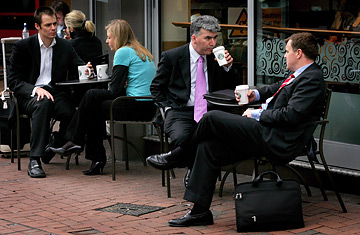
People drink coffee at a Starbucks Coffee store in central London .
Oh, please. I grew up with that genuinely local deal, and let me tell you about it. In a cold room with formica-topped tables, hard-backed chairs and a slatternly proprietress with a fag gummed to the corner of her lip, "coffee" consisted of hot water poured onto a spoonful of instant Nescafe. It tasted like dishwater. If you were adventurous, you mixed the instant with boiling milk, which gave you, let's see, instant-coffee-flavored milk. To accompany this beverage, you could have the following: a custard cream, which was a sort of sandwich cookie with some smegma-like yellow goo between its baked bits; a wafer with some raisins stuck in it, known in our family as "squashed fly biscuits" but more properly called Garibaldi biscuits (though God knows what the hero of the Risorgimento had to do with it); an iced bun, which was a tube of dough and air (mostly air) with some white frosting on top; or a sticky bun, which was, well, pretty much what it sounds like.
Yes, yes, I know — the British drank tea, not coffee, so there was no particular reason to think that they would know how to make a good cup of java. Thing is, if anything, the tea in those "genuinely local shops" was worse than the coffee. You could either take your tea "as it comes," which meant weak as dishwater. Or you could take it strong — which was, it was thought, how the working class took their cuppa, and hence how slumming members of the bourgeoisie such as George Orwell insisted on having it. In that case, you put one teaspoonful of leaves into the pot for each person drinking from it, and then added another teaspoonful "for the pot." The resulting brew would put hair on your chest; the only way to make tea that strong drinkable was to shovel so much sugar into it that it became a sort of chemistry experiment, testing the absorptive capacity of a cupful of water. Oh, and — together with the iced and sticky buns — sweet tea also led to (how can we put this nicely?) those distinctive dental challenges that identify baby-boom Brits. Trust me, I know.
Ye Gods, who could regret the cloning of the high street when you grew up with all that? Turn your nose up at cappuccinos, lattes, pain au raisins, proper muffins with proper fruit — even if you have to pay through the nose for it? (And let me tell you, all those stories you've heard about how expensive London is? They don't come close to the ghastly truth.) Shed a tear for the "genuinely local coffee shops"? Don't think so. Mine's a triple grande skim latte, and the only regret is that I had to wait until I was middle-aged to buy it in London.
